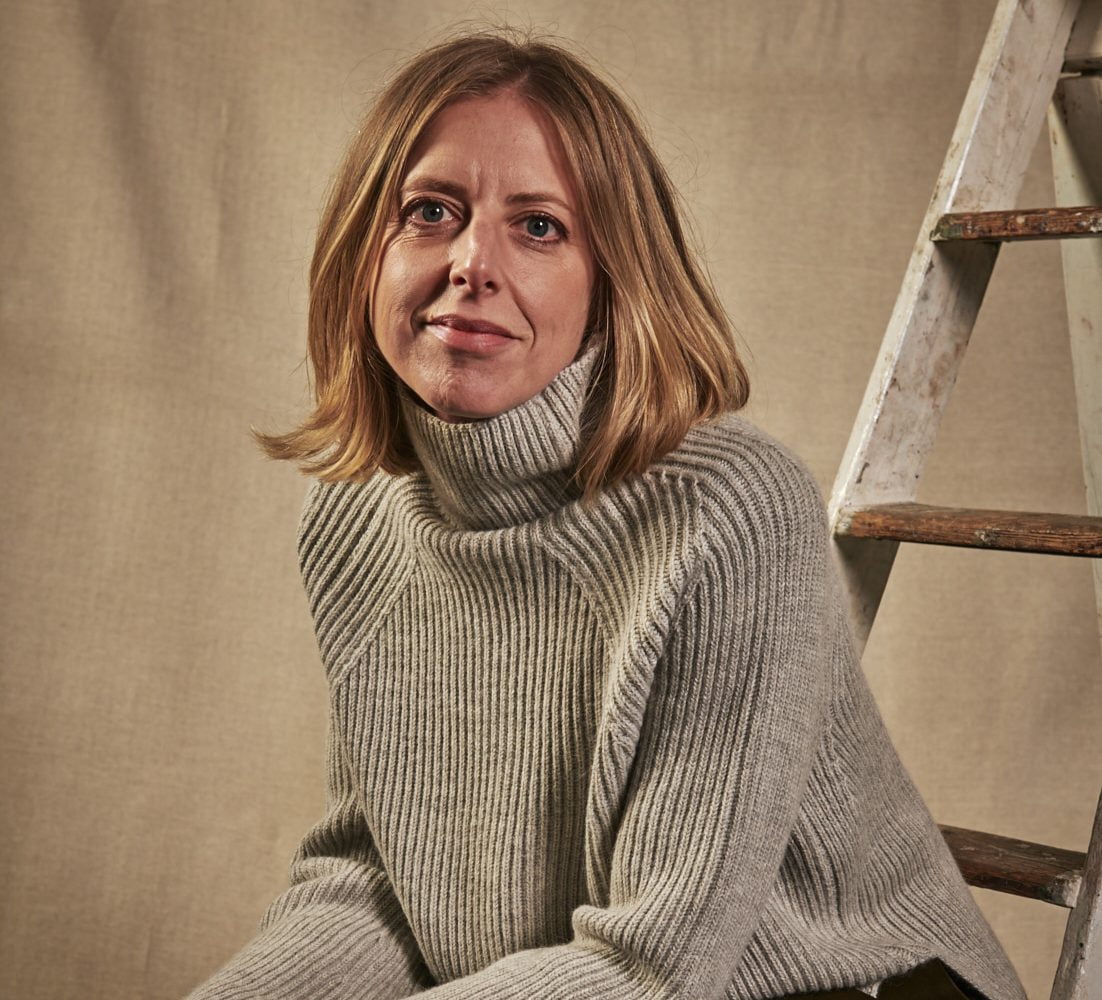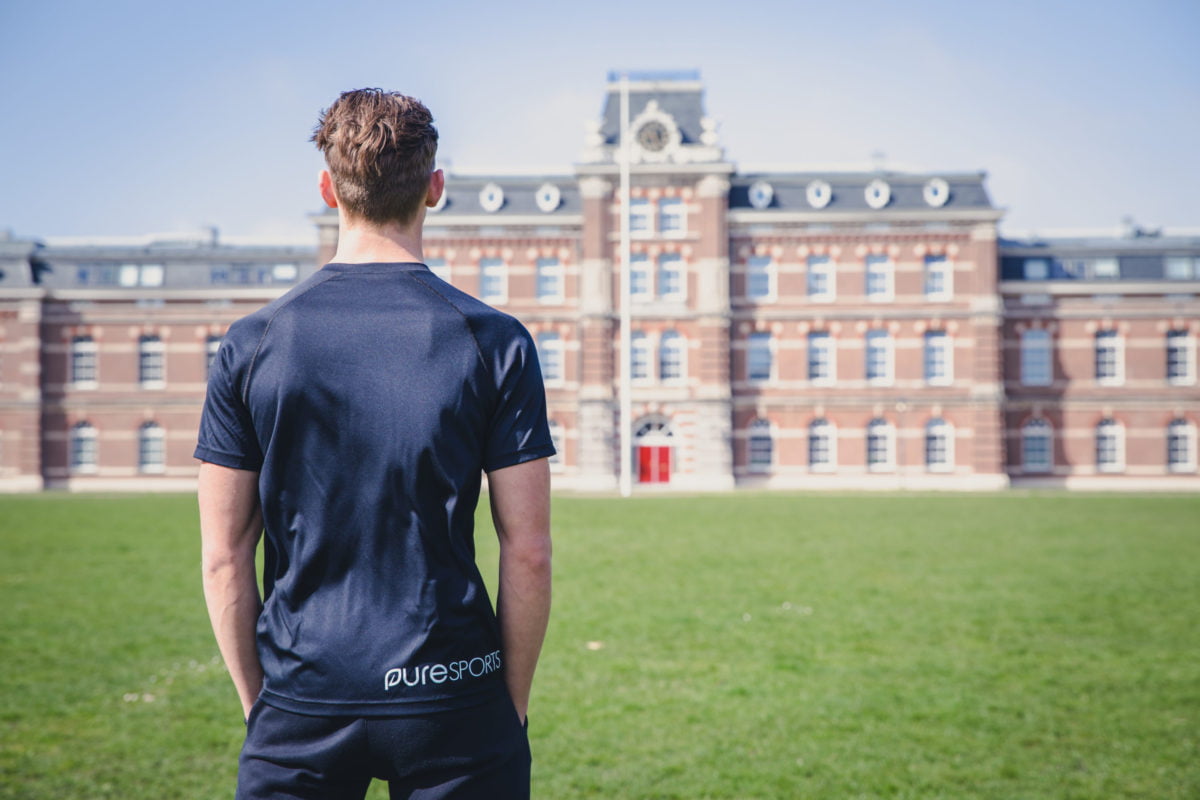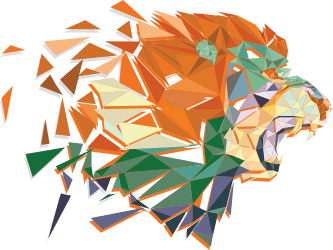In this week’s Entrepreneur Empowerment article, we catch up with Frankie Davies, founder of ethical and sustainable knitwear brand, Charl Knitwear. We talk about her approach to success, overcoming barriers, positive mindset musts and her top lessons for navigating your way along the entrepreneurial journey.
A Bit About the Founder, Frankie Davies
I grew up in Norfolk and source much of my fashion inspiration from my childhood memories of the Norfolk coast. I’m committed to ethically sourced and crafted knitwear, rooted in sustainability and traceability, having worked as a knitwear designer and knowing there is a kinder side to fashion.
I’m a keen Italophile from my many years living in Italy, so I absolutely love travelling over there to visit friends and both new and familiar places. I also love cooking Italian food and watching classic Italian films.
I have two little boys so pretty much all of my spare time is taken up with entertaining them! We are members of a farm co-operative which we help out at, especially in the summer months. We also go biking, running and generally explore the countryside. We live near the Cotswolds so there are lots of lovely walks to do.
I regularly practise yoga which I enjoy and this really helps to keep me balanced! I also knit both by hand and on my machine.
I have worked in the luxury knitwear sector for over 20 years. First in Milan and Treviso for Benetton and then at Burberry London, before starting my own knitwear consultancy working with smaller brands.
Working from an insider’s perspective, I was aware of the need for sustainability and traceability before the consumer. It was more a case of social responsibility and raising awareness that the existing production model was not sustainable and could be much improved upon from this perspective.
About the Business, Charl Knitwear
I founded Charl Knitwear in January 2019, which is named after my sister Charlotte – my lifelong muse.
Charl Knitwear’s latest limited edition collection is rooted in the iconography of the traditional knitted ‘Gansey’ jumpers which were worn by Norfolk’s fishermen to protect them against the elements before the development of newer, synthetic materials.
The new collection consists of ten key pieces. It aims to bring to life the lost world of the Norfolk fisherman and is the result of extensive study on hand-knitted Gansey pieces with an exciting, modern interpretation.
The natural fibres used are a selection of certified British wool, un-dyed or naturally dyed cashmere and undyed baby Alpaca, all of which have been carefully sourced and ethically manufactured in the UK and Italy.
Why did you set Charl Knitwear up? What were you looking to do both on our entrepreneurial and personal level with running your own business?
Although I officially introduced the brand in 2019, I first launched this version of Charl Knitwear before I had my children. When I was living in Italy and consulting for other people, I realised I fancied doing my own thing.
I really wanted to do loungewear, and that was what my business was initially: Charl Loungewear. Deriving inspiration from Burberry’s capsule collections and travel collections, I wanted to use my experience in designing their loungewear and cashmere collections, complete with sweats and jogging bottoms.
But just as I was about to launch Charl Loungewear and welcome my first child, it hit me that I didn’t think I could do both things: be a new mum and launch a new business all at the same time.
I’ve got friends that had startup businesses and I saw how hard they were finding it, so I temporarily put it on hold. While I was having my children, it remained at the back of my mind. Coupled with everyone asking: “When are you going to go back to it, Frankie?”
Although I may have been about to launch a loungewear collection, Charl KnitwearI has its roots in heritage knitwear. When I was first conceptualising Charl Knitwear, 10 years ago, the world was a different place. I do think it’s important now to see where things are coming from and to have a reason to buy something. So it’s not just another piece of knitwear or another bit of clothing. I think it needs to have more meaning and more depth to it.
I hope other people feel this way, or are starting to feel like this as well. When you buy things for your home, for example, you want it to be a piece that’s really worth buying. It’s almost like you want it to be an investment piece. You don’t just want to buy something generic, that everybody else has. Generic items are fine for filling in the gaps, but you want some pieces that are going to hold their value and also have an emotional value to them. That’s what I felt was important when creating my collection.
There was a real story behind my collection. When I design things, I like them to be functional. The story is a kind of continuation on that. It’s not just a story, a fiction; it is actual, proper, it has people’s authentic stories behind it.
What led you to go, “Okay, right now I need to set up Charl Knitwear?” What do you remember about those early days?
I always had the idea to create my own collection bubbling away in the background. I think as the children were getting older and my youngest started school, I wanted to get back into my own collection again.
I love doing consultancy for other people too. I think that’s really important because it keeps you really up to date with what’s going on in the sector. It’s also the contact you have with other people when consulting that I enjoy too.
When I decided to launch Charl Knitwear, it was directly after Stacey Dooley’s Fashion’s Dirty Secrets documentary, which informed the consumer about what happens behind the scenes in the manufacturing processes. It compelled me to put my beliefs into practice.
I am responsible for all activities undertaken by Charl Knitwear, from designing the products and sourcing the raw materials all the way through the process to marketing and sales. My biggest achievement so far is producing a collection which hasn’t had to compromise on sustainability or traceability.
The whole thing is a balancing act. I think as a freelance person, it’s hard because you don’t have that job security that you’d have if you were on a payroll.
What/Who has helped you along the way to continue to grow and evolve?
Mentors are invaluable. And not just when you’re starting out, but throughout building your brand and running your business. You can get to a place where you’re like, “Right. I’ve done everything that I set out to do, but now how on earth do I get to the next point?”
I think certainly with industries such as fashion, the value comes from when someone’s on the same pace level as you.
It’s the same when you’re choosing a factory to work with: they need to get what you’re trying to do. It can be a really good factory but if you don’t click with the person or the factory doesn’t really get the style that you’re trying to get across, it’s just much harder. It doesn’t come naturally. And I think with most things, if it comes naturally, then it’s meant to be. If you have to force something, it’s probably not.
I’ve been lucky enough to have so many inspirational and supportive people around me. Michelle Smith from Burberry helped me enormously and was an incredible source of guidance. I also had a really inspirational teacher at university, called Ian Griffiths, who is the creative director for Max Mara. He was really good at getting people placements and jobs after graduating.
I also had lots of friends when I worked at Benetton, many of whom came from textiles backgrounds. I had a really good friend whose family owned a knitwear company, for example. I learned a lot from working with them.
Living in Italy, I saw a lot of small family-run businesses, like the factory that I work with. It’s really more like a family-run business and they’re passionate about what they do. That makes it so much more personal. You want to work with them too because they’re not doing it because it’s a job. They’re not just doing it for money. They’re doing it because that’s their life choice.
I didn’t want to become famous. That wasn’t the objective of doing it at all. The more I knew about the business, the more I could see that you could make a sustainable knitwear company. I joined all the dots together to make it work.
Do you have ‘mindset musts’ that you swear by?
At the moment it’s really hard because I’ve been homeschooling. So getting the balance right is just impossible. So I’m really suffering from it at the moment.
It’s coincidental that you’re asking me now because I’ve just decided I need to start doing meditation every morning because I’ve noticed it works. I’ve talked to so many friends that swear by it. I’ve tried it and have gone through phases of it. I do yoga regularly too. I did a Deepak Chopra meditation course earlier this year that friends invited me to take part in.
It stops me from jumping on my phone first thing in the morning and thinking about what I’ve got to do. Especially with social media, it’s really hard. Also, I try not to look at my phone in the evenings past a certain time, usually around nine o’clock.
Finding a good course teacher to support you with yoga, meditation, or any other activity can help too, I’ve found. They’re expecting you to be there on a Monday night, for example, which acts a safety net because you say: “Right, I’ve paid for the course, I’m doing it. I don’t have to analyse whether I feel like doing it today or not. I’m just doing it.”
I’m the same with running. I tried all through lockdown and I was running twice a week really early in the morning. It was really nice because then you think: “Oh, I’ve done the thing for myself for the day.”
It’s so hard to sustain anything like that in the long term though, isn’t it? It’s almost like you go through phases of being more focused and less focused. So I suppose it would be really handy to have a life coach that says: “Yeah, come on. You can do it. Keep going. Don’t have a lull.”
I don’t think you ever really quite get to the point where you’re like: “Yeah, I’ve got it all sussed.” I think it’s always ebbing and flowing.
How do you cope with and overcome barriers?
I think it’s still a work in progress to be honest. Having to learn how to get the product from a concept through to an actual collection is what I’m trained in. I know how to do that and that’s what I’ve done. I know all the factories and suppliers and the process and manufacturing side of fashion.
The really, really hard thing for me is the marketing part. It’s a constant reminder to me that I do need to reach out to people. Marketing isn’t my expertise, it’s not my skill set. That’s the bit that’s challenging. So it is reminding myself that I have got a network I can call upon.
It’s hard because you try things and that thing works, that didn’t work. You have to take a step back. When you’re in the middle of something, you have to just think: “Oh it’s all right. That thing was a bit annoying but take a deep breath. You need to look at the bigger picture.”
I think it is really important to have a network of people around you that do have those kinds of skills. It’s even friends that have those skills because you can ask. You can call in a favour and then return a favour with something you can do for them.
How do you define success for you and how do you celebrate it?
It’s in the moment. You’ve got to live it in the moment.
I think success is just trying to get a good work-life balance. For me, it’s making things that people value and look forward to putting on that make them happy.
Something that I’ve always struggled with regarding fashion is that it’s such a superficial thing. It’s not like being a doctor or somebody that’s really, really benefiting people. But I do like to think that when you are going through really difficult times, whatever that might be and it can be really personal, it’s little things that help make your day a bit brighter.
So if it is something like putting on some nice clothes that make you feel good, then that’s really important. That has certainly helped me in difficult times, like sadly, when my mum passed away a few years ago. I treated myself to some clothes that I really wanted. I felt like it was so superficial, but it just made my day a little bit easier. And I think if people, when they wear my knitwear, feel like that, (and I hope they do), then that’s success to me. That’s what I want people to feel.
And maybe pass their jumpers onto somebody, like to their daughter or their son, in a way that Gansey jumpers would have been. I’ve got a friend who’s dad’s got a Gansey jumper and he passed it onto her. There are all the memories then of when you wore that jumper, which you did when you were kids on the beach in North Norfolk. It’s a nice way of consuming things, having things It’s something that you cherish that makes you smile when you wear it.
What are the top lessons you’ve learnt as an entrepreneur?
1. Asking for help
To reach out to people more because I’m naturally quiet. I’m not an introvert at all, but I don’t find it easy to ask for help. So I think it’s not being proud and saying: “I don’t know how to do this, can you help me?”
I think that is the hardest thing I’ve had to accept. A lot of the time other people have been in that position and they can advise you. It’s reassuring.
2. Keep going
Believe in yourself and your business idea. If you’ve got a really good reason for doing it and you really believe in your mission, then hang on in there.
Ask yourself: why are you doing it and do you think it’s still relevant and important? If it is, then you’ve got to keep going with it. And when things get a bit much, take a step back and look at the bigger picture.
3. Know what makes you stand out (Clue: It’s you!)
Research other people who are doing it and see why. Make sure there’s a reason yours stands out. Because you don’t want to be another person doing the same thing. You need to have a unique selling point. You need to have a point of difference and that’s often the person behind the brand, you.
When you start a business, you tend to think it’s the idea that’s the important thing. But what I’m realising is that it’s not just about the product or the idea, it’s about the person behind it that people are interested in. And that’s the motivation behind the business as well. So you’ve got to be prepared to show people who you are. .
I can remember someone saying to me about social media, the posts that get the most views are those that are pictures of yourself or a film of you doing something — and it is so true. You get so many more likes, views and people noticing when you bring yourself to the brand.
4. Adapt and evolve
You have to keep going back to your brand too and honing it. Be prepared to put a bit of you into it as well if you feel comfortable with it. If you don’t, think carefully about your brand. When I think about other brands that I’ve worked with, if you don’t think you would buy it yourself, then it’s very difficult to expect anyone else to buy into it.
Obviously you need to have a customer profile and you need to research who your customers’ are going to be, but it’s got to be convincing. If it’s not convincing to you, chances are it’s not going to be convincing to anybody else either.
5. Love what you do
It’s not easy. It’s not something that you do and suddenly make loads of money really quickly from (or very rarely is it that). It’s got to be something that you love. It’s a life choice. You really have to want to do it for the long term.
Check out Charl Knitwear over at Instagram @charlknits
You can also take a look at our entrepreneur empowerment movement here or over on Instagram @lionspiritmedia.





0 Comments